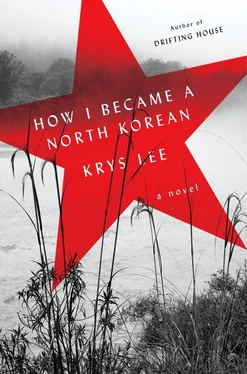The moment the door opened, I saw Jangmi’s wet nightdress reveal her like a clear glass of water. She was soaked, her water-logged skirt hiked up to mid-thigh, and so thin she looked like she might shatter if you held her. But when I saw Missionary Kwon behind her, his granite hand on her hip, I was the one who cracked.
I tried to forget the way Jangmi’s nightdress had revealed her. The way Missionary Kwon looked at me as if he were peering through a microscope.
During the next day’s morning service I willed myself not to think, to disappear, when we sang the words “As the deer panteth for the water so my heart longeth after you. You alone are my heart’s desire and I long to worship you…” and then a half hour later, as Missionary Kwon intoned, “It is impossible to please God without faith…” But I resented the gleam of his leather shoes set parallel to each other by the door, his scrubbed smell of pine soap. His white collar, his skin pink and glowing with health like a middle-aged baby, when the skin under my arms was red and prickly with heat rash. There was no calm to be found in a woman turned into a pillar of salt. A man’s head served on a platter. An ark floating while all of humanity drowned.
When the rest of us sat down for lunch, Cheolmin stood like a soldier and announced, “I couldn’t memorize my verse.”
Bakjun stood up beside Cheolmin. “I couldn’t, either.”
Namil raised himself to his knees. “I didn’t, either.”
Cheolmin and Bakjun looked angry and uncertain, as if this was as far as they had planned their rebellion. They looked at Missionary Kwon.
“All of you?” Missionary Kwon set down his chopsticks. “All three? And the rest of you let this happen? Do the Lord’s words mean anything to you? Do you know why you’re here and not out on the street?”
“It’s August. We’ve been stuck inside for months.” Cheolmin scraped at his cheeks and flicked away the dead skin. “We’re living the same day over and over again and nothing’s changed. You haven’t kept your promises.”
“Listen to that rain.” Missionary Kwon ran his fingers through his gelled hair in one even, controlled motion. “There’s a lesson in that rain. It’s a sign, another Noah’s ark, God has sent another flood.”
“Noah’s ark?” Namil frowned, our early lessons already forgotten.
I said, “Who do you think he’s cleansing?”
Missionary Kwon stood up and lifted the saang high above our heads so that our chopsticks hovered in the air. He had the audacity to look smug. “Today we’ll skip lunch together and pray on an empty stomach. It will give you clarity.”
We hadn’t crossed and risked our lives for this.
I wasn’t surprised when Cheolmin punched the air with his fist. “I don’t want anything to be clear — I want to eat!” He looked ready to kill. He snatched Missionary Kwon’s Bible from his side and hurled it across the room. A thud resounded; the paper tore.
Missionary Kwon gasped, and his hand flew up to protect his heart. “Gwangsu, Daehan, the rest of you, cover the dishes and store the banchan in the icebox for now.” His voice was trimmed of feeling and he avoided Jangmi and me, as if we didn’t exist.
He said, “Thanks to Cheolmin, we’ll fast and pray for a few days and begin our relationship with God over again in the right state of mind. For ‘Man shall not live by bread alone, but by every word that comes from the mouth of God.’”
He instructed me to take the storeroom’s boxes of canned goods to the front door, then began emptying out the kitchen drawers: dumplings freshly rolled for the night’s dinner, a tub of kimchi we had seasoned together, a shelf of vegetables and another of fruit, all the cartons of banchan, packages of dry noodles. All of it was deposited into large plastic bags that he ordered Daehan to help carry to the car. He said, “There are others who will appreciate this.”
“You mean we won’t be eating at all, when there’s food?” Bakjun’s knuckles scrubbed at his face as if to erase himself. He looked confused and hostile and sorry all at once. “All of us, for days?”
Daehan’s hand only passed over his face like a fan, and he lugged the heavy sack out, his feet as heavy as flagstones. I didn’t move.
When Missionary Kwon had his nose in one of the drawers, Cheolmin spat on the floor and in one swift movement rammed him with his head, pushing Missionary Kwon into the wall. It was as if my wishing had made it happen. Bakjun took the cue and grabbed the missionary by the shirt with two fists. “You liar!”
Cheolmin said, “Come on! We’ll get goryangju with his money.”
Namil and Gwangsu followed as they clamped themselves on the missionary’s legs. I could have stopped them, but instead I let them sabotage months of patience. When Jangmi limped in the missionary’s direction, I blocked her behind me. I said, “He deserves worse.”
“How dare you raise your hand to me? To God’s representative?” Missionary Kwon ripped Bakjun’s hands away from his shirt and pulled him up, dangling him in the air. “We’re giving you an opportunity! And you can’t stay still for five minutes to draw strength from his words when there’s hundreds of thousands of your people who live on garbage every day!”
Cheolmin bit the missionary’s hand and forced him to release Bakjun. Cheolmin said, “One! Two! Three!” and they tipped the missionary over as if he were a pine tree.
The missionary shouted, threatened. “Yongju! Yongju!” he pleaded. I didn’t let anyone help him. Sweat rimmed his lips and the bridge of his nose, soaked his collar. His limbs jolted like an epileptic’s. The boys were as excited as a pack of dogs, and their movements shook the lantern on the saang . Their hands had finally found an object for their anger and they kicked and punched and tore, communicated in a language they understood.
Their hands were my hands. Because I now knew hands blistered and feet cracked white by the weather. How to sleep with rats the size of rabbits, how to endure the slow crawl of lice. How drinking helped you live with unlivable fear. How you could wake up with frozen icicles in your hair, not knowing if one of the boys would be frozen dead, forever fourteen. How being locked in was a kind of daily death. I understood what it meant to be a North Korean in China. Because I was one of them.
Jangmi flew out from behind me and pried Bakjun’s hands from the missionary’s chest, but Cheolmin pushed her away and she fell. She limped in a fretful semicircle around them like a stray cat. She clutched her stomach, her phantom child.
I felt helpless. There was nothing I could do for her or for any of the people I had lost. When I closed my eyes, I saw Missionary Kwon’s dirty hands on her body. The cycle was as clear to me as a simple sentence; I wanted to break it.
“Is this your plan? Simply to hurt him and release your anger, then wait for your punishment? Tie him up,” I said. “Make him call a broker and get us out of this country. One of us can stay and watch him while the others leave — maybe Daehan?
“Or I’ll stay.” My thoughts spun beyond me.
I came back from the kitchen with the laundry cord and the kitchen scissors, and instructed the others to hold down his arms and legs. I sawed the rope into two with the scissors and used half to strap his arms so tightly back that the white shirt buttons strained against the convex curve of the missionary’s stomach.
By the time Daehan returned, my work was done. When he saw us, his hands rammed into his crinkly hair and raised it into a bush. “Oh no, no!” he said. “You’ve got to stop!”
I didn’t want it to stop.
“How dare you? Boys, calm down! Let’s discuss this!” our overthrown ruler said. His muddled roil of thoughts were more a trail of panic than sentences. He pleaded, threatened. “Lord, why have you forsaken me?”
Читать дальше












